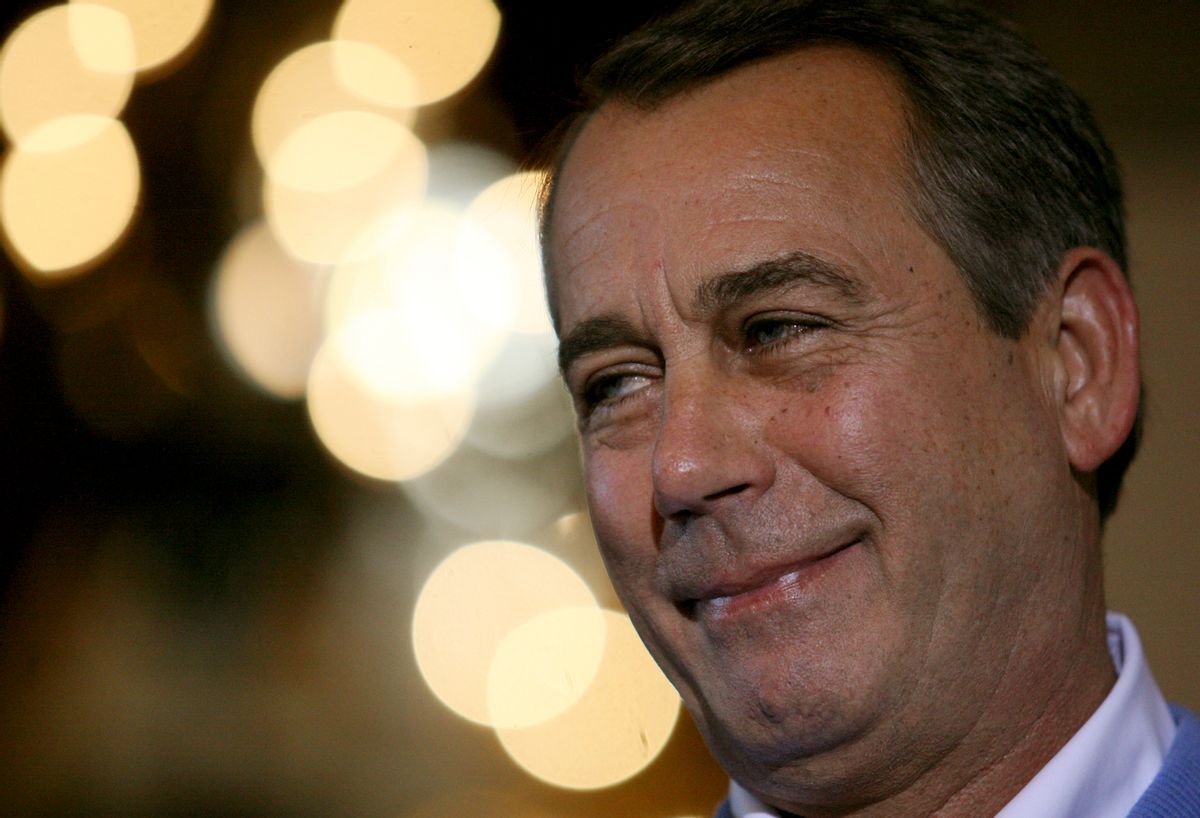On Friday, the New York Times reported that Democrats were "indignant" at Republican demands that an extension of unemployment benefits must be paid for with new spending cuts, even as GOP legislators continued to demand massive tax cuts unbalanced by any corresponding impulse to thriftiness. On Monday, as rumors of a deal trading a possible two- or three-year extension of all the Bush tax cuts in exchange for a one-year continuation of jobless benefits appeared to be solidifying into reality, the adjective got an upgrade. Now, Democrats are "outraged."
Semiotically speaking, the change in tone is way overdue. It's hard to summarize the ongoing debacle more pithily than a tweet from the Nation's Chris Hayes early Monday morning: "Just so we're clear: Democrats, currently in charge of Cong and WH, are about to ratify single defining domestic policy of W." After years of campaigning on a platform of ending the Bush tax cuts on the wealthy, President Obama has thrown in the towel.
But outrage is cheap. Votes count, and on Saturday, Senate Democrats weren't even able to pass a bill that would have restricted a tax hike only to Americans earning more than $1 million a year. Four Democrats -- Russ Feingold (Wis.), Joe Manchin (W.V.), Ben Nelson (Neb.) and Jim Webb (Va.) -- and Joe Lieberman joined with the Republicans to send the motion to defeat.
And yet, that still means that 53 Democrats did vote for ending at least a portion of the tax cuts. Now the question becomes: How many will fall in line behind Obama and ratify whatever deal ultimately emerges? If President Obama doesn't draw a line in the sand, is there a feisty liberal -- say, perhaps, Bernie Sanders -- willing to filibuster and force Republicans to cobble together their own 60 votes? Or, if Senate Democrats fail to show the necessary gumption, what about Nancy Pelosi's House? When Republicans are outraged, they bring the machinery of government to a grinding halt. But, so far, Democrats mostly just squawk.
Of course, Democrats would pay a price for acting like Republicans. Supposedly, in return for extending all the tax cuts, Republicans will agree to a one-year extension for unemployment benefits, allow the ratification of the New START treaty and end "don't ask, don't tell." Those would all be good things, and a real declaration of war by Democrats would put a halt to any short-term progress in achieving those goals.
So would it be worth it? Paul Krugman offers an answer:
If Democrats give in to the blackmailers now, they'll just face more demands in the future. As long as Republicans believe that Mr. Obama will do anything to avoid short-term pain, they'll have every incentive to keep taking hostages. If the president will endanger America's fiscal future to avoid a tax increase, what will he give to avoid a government shutdown?
A "deal" that sacrifices too much now will lead to worse bargains with stronger Republicans in the next Congress. And if you think it's fun watching the sausage get made today, just wait until 2012, when we'll probably play this entire tax cut game all over again.
Which brings us the most astonishing passage in the New York Times' coverage of the tax cut deal -- referring to the likelihood that negotiators will agree to a two-year deal.
Many Republicans say they want a permanent extension of the rates, or as long an extension as possible. Democrats say they would not mind the issue coming up during Mr. Obama's re-election bid, because they see it as politically helpful to them in painting Republicans as defenders of the rich.
Politically helpful? In what universe? Their feeble efforts to tar Republicans as defenders of the rich failed miserably in the run-up to the midterms. American voters are fickle, but memories aren't that short. Any posturing on this issue in 2012 will be irredeemably stigmatized by the poor showing Democrats made attempting to force the issue in 2010. To have any chance of changing attitudes two years from now, Democrats need to stop acting like pushovers today.



Shares